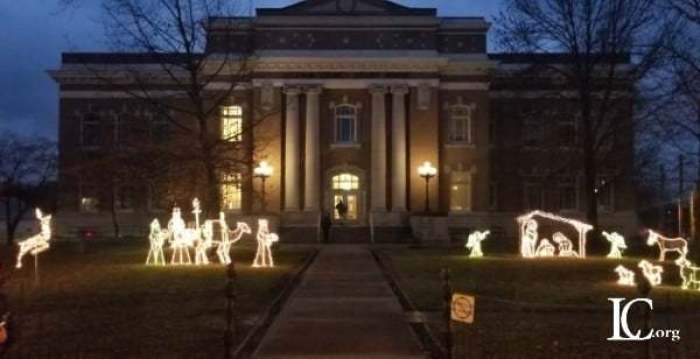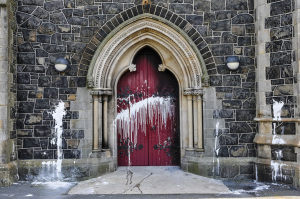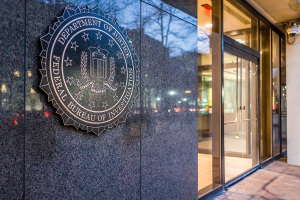Nativity scene outside Indiana courthouse is constitutional, 7th Circuit rules

The 7th U.S. Circuit Court of Appeals on Tuesday reversed a lower court ruling that found that an annual nativity scene displayed outside a public building in Jackson County, Indiana is unconstitutional.
The three-judge panel ruled 2-1 Tuesday that the presence of the nativity scene outside Jackson County's historic courthouse in Brownstown doesn't constitute a government endorsement of religion and doesn't violate the Establishment Clause of the First Amendment.
This decision marks one of the first federal appeals courts to apply the Supreme Court’s 2019 precedent when it ruled that a 40-foot cross located on public land in Maryland is constitutional.
“Applying American Legion, we hold that Jackson County’s nativity scene as displayed in 2019 does not violate the Establishment Clause,” the court’s majority opinion states. “We make no predictions as to how American Legion might affect other types of Establishment Clause cases.”
The appellate court's decision comes more than two years after the Freedom From Religion Foundation, a secular group that advocates for a strict separation of church and state, sent a letter to Jackson County commissioners arguing that the nativity scene was a "violation of the First Amendment."
Shortly thereafter, the American Civil Liberties Union of Indiana sued on behalf of local atheist Rebecca Woodring, who said she was offended by the display.
Circuit Judge Amy St. Eve, a Trump appointee, explained in the court's decision that "the display consists of a waving Santa Claus with his sleigh, a reindeer, seven large candy-striped poles, the nativity scene (also known as a creche), and four carolers standing in front of a lamp post."
The display goes up every year at the historic Jackson County Courthouse. Even though the county courts moved to a new judicial complex, the building is still referred to as a "courthouse." The building is still used as office space for the county
treasurer, auditor and other officials.
According to Woodring, the display "celebrates Christianity" and constitutes a "religious display on government property." She contends that even the secular aspects of the display offend her because it is all "part of the Christmas and the whole, you know, Christianity thing."
St. Eve frequently referenced the Supreme Court case American Legion v. American Humanist Association. The Supreme Court ruled that a cross erected on public land in Maryland to honor local soldiers who gave their lives in World War I did not violate the First Amendment's Establishment Clause.
St. Eve argued that the Supreme Court had developed a test known as the Lemon test to determine whether religious displays violated the Establishment Clause. For a religious display not to violate the Establishment Clause, it must "have a secular purpose," a "principal or primary effect" that "neither advances nor inhibits religion" and cannot "foster excessive government entanglement with religion."
"Although some aspects of American Legion are unclear, one unmistakable message from the opinion is that Lemonis no longer a viable framework for cases 'that involve the use, for ceremonial, celebratory, or commemorative purposes, of words or symbols with religious associations,'" she wrote.
"American Legion displaces the purpose and endorsement tests in the context of Establishment Clause challenges to nativity scenes in passive Christmas displays on government property."
In a dissenting opinion, Circuit Judge David Hamilton, an Obama appointee, argued that the majority’s opinion would invite “many new challenges to Establishment Clause precedents.”
“[The majority opinion] shows that the Establishment Clause’s core concern over religious endorsement still drives which displays end up on which sides of the constitutional line,” Hamilton argued. “The majority opinion simply bakes this concern into its view of what our American ‘tradition’ is and is not.”
Mat Staver, the founder and chairman of the Liberty Counsel, which represented Jackson County in the litigation, praised the 7th Circuit's ruling. In a statement, he argued that the Lemon test has "proven to be unworkable" and has led to "inconsistent and contradictory decisions on the constitutionality of religious displays."
"This is a great victory that affirms that the Jackson County holiday display does not violate the First Amendment," Staver said. "The Supreme Court and many federal courts have ruled such displays are constitutional, especially when the display includes other secular symbols of the holiday, and this display is no exception."
Annie Laurie Gaylor, the co-president of FFRF, condemned the ruling.
"The court is arguing that if the constitutional separation between state and church is repeatedly entangled, this 'history' of repeated entanglement somehow magically erases the violation," she said in a statement. "This is an insulting sleight of hand. Winter season after season, a courthouse display endorses Christianity. Such repeated exposure obviously makes the violation cumulatively much worse."





























